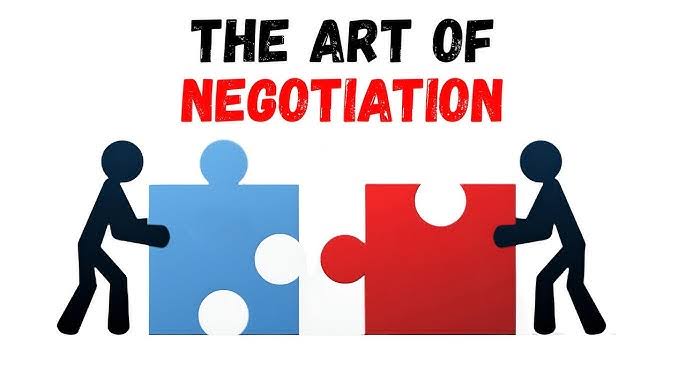Negotiation is an important skill used in many areas of life. Whether you are asking for a raise, making a business deal, solving a disagreement, or deciding where to eat with friends, negotiation helps you get good results. In July 2025, with work becoming more connected and flexible, being good at negotiation is more important than ever. Today, negotiation is not just about being bold or charming. It needs careful planning, understanding feelings, being flexible, and knowing how people think. Learning to negotiate well helps you achieve your goals and build trust and strong relationships over time.
Understand What You Want and Why
One of the first steps in effective negotiation is having a clear understanding of what you want and the underlying reason behind your goal. Many people enter negotiations with vague objectives, which weakens their position. For instance, if you want a salary increase, you need to be clear about the amount, the justification for that increase, and how it aligns with your contributions and market standards. Self-awareness helps frame your argument more persuasively and also prepares you for any compromise that may come.
Do Your Homework
Preparation remains one of the most powerful tools in negotiation. Research all relevant data, including industry benchmarks, pricing trends, competitor strategies, or the person you are negotiating with. In 2025, with data more accessible than ever thanks to advanced analytics tools, there’s no excuse for walking into a negotiation uninformed. The more knowledge you bring to the table, the more confident and credible you will appear, allowing you to counter objections or propose alternatives effectively.
Listen More Than You Speak
One of the most underrated but powerful negotiation techniques is active listening. Too often, people are so focused on what they want to say next that they miss critical information from the other side. By genuinely listening, you can identify underlying needs, emotional cues, and points of flexibility. Active listening builds rapport and often reveals opportunities to craft win-win solutions. In 2025’s workplace culture, emotional intelligence and empathy have taken center stage, making this skill more relevant than ever.
Create a Win-Win Scenario
Negotiation should never feel like a battle where one party wins and the other loses. A productive negotiation seeks to create mutual benefit. Whether it’s through value-added bonuses, alternative forms of compensation, or flexible terms, finding ways to satisfy both sides creates stronger, more lasting agreements. Understanding the other party’s interests and priorities is key to building solutions that feel fair and constructive.
Master the Power of Silence
Silence can be an incredibly powerful negotiation tool. After you make a point or proposal, resist the urge to fill the silence. Many people feel uncomfortable with pauses and rush to speak, often making concessions or backtracking on their position. Learning to be comfortable with silence shows confidence and encourages the other party to respond more thoughtfully, sometimes even revealing information they wouldn’t have otherwise shared.
Control the Environment
Where and how a negotiation takes place can influence its outcome. In face-to-face settings, a neutral location can make both parties feel more comfortable. In virtual negotiations—which have become increasingly common in the post-pandemic era—ensuring a quiet, distraction-free environment is key. Subtle factors like time of day, video setup, or even lighting can affect mood and decision-making. Being deliberate about your environment can give you a psychological edge.
Be Willing to Walk Away
One of the most empowering positions in a negotiation is the willingness to walk away. If you’ve done your homework and know your value, you must be prepared to say no when the terms do not meet your bottom line. This doesn’t mean being rigid; rather, it’s about knowing your boundaries. Walking away respectfully sends a strong message about your confidence and can often lead to better terms being offered later.
Use Anchoring to Your Advantage
Anchoring is a psychological tactic where the first number or proposal sets the tone for the negotiation. If you’re negotiating price, salary, or contract terms, making the first offer can establish a reference point. Even if the final agreement deviates from that anchor, it often remains closer to it than if the other party had initiated. However, anchoring should be done with care—your opening offer should be ambitious but not unreasonable.
Ask the Right Questions
Asking strategic, open-ended questions can shift the conversation in your favor. Questions like “What’s most important to you in this deal?” or “How do you see this benefiting both of us?” help uncover motivations and identify possible areas of flexibility. Skilled negotiators use questions not just to gather information but to guide the conversation and keep the dialogue constructive and collaborative.
Remain Calm Under Pressure
Negotiations can sometimes become tense, especially when money or critical interests are involved. It’s crucial to maintain composure, even when the other party becomes aggressive or emotional. Keeping your cool not only helps you think clearly but also gives you the upper hand psychologically. In 2025, mindfulness and stress-management techniques are increasingly incorporated into professional development for this very reason.
Follow Up and Reinforce the Agreement
Once a deal is struck, the negotiation isn’t quite over. Follow-up is essential to solidify agreements and set expectations for implementation. Put everything in writing to avoid misunderstandings later. Express appreciation for the negotiation process and reiterate any shared goals or outcomes. Building a positive post-negotiation relationship ensures that future dealings will be smoother and more collaborative.
Conclusion
The art of negotiation is a balance between preparation, emotional intelligence, assertiveness, and strategic thinking. As the professional and social environments of 2025 continue to evolve, the ability to negotiate effectively is not only a valuable career skill but also a critical life tool. Whether you’re aiming to advance your career, secure a better deal, or resolve a conflict, these tips offer a practical framework to help you get what you want—while leaving the other party feeling respected and satisfied. Mastering this art will empower you to navigate the complexities of modern life with confidence and clarity.



